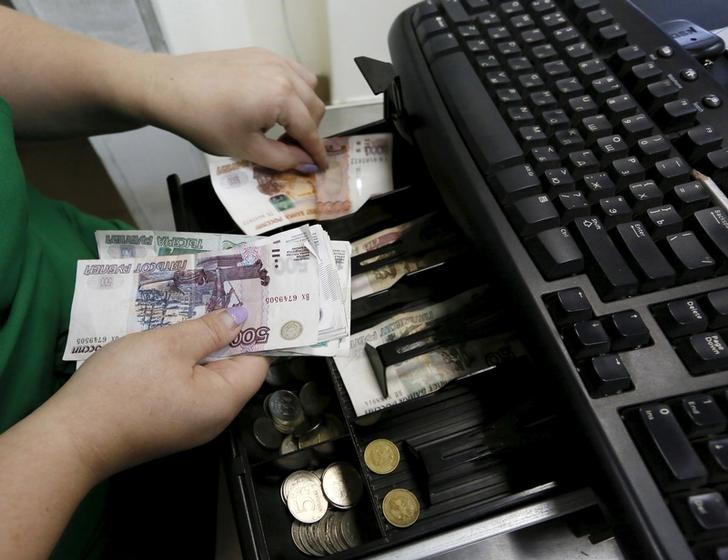 © Reuters. A vendor places Russian rouble banknotes at a grocery shop in Krasnoyarsk
© Reuters. A vendor places Russian rouble banknotes at a grocery shop in KrasnoyarskMOSCOW (Reuters) – The rouble weakened and shares in Russia’s top lenders Sberbank and VTB fell on Wednesday after the Kommersant daily said they could be banned from operating in the United States under proposed U.S. sanctions legislation.
Kommersant published what it said was the full text of a draft U.S. law outlining possible penalties against Russia. The document https://www.kommersant.ru/docs/2018/_2018d140-Menendez-Russia-Sanctions-Bill.pdf cited potential restrictions on the operations of several state-owned Russian banks in the United States.
Republican and Democratic U.S. senators introduced the legislation earlier this month to impose stiff new sanctions on Russia and combat cyber crime, the latest effort by lawmakers to punish Moscow over its alleged interference in U.S. elections and its activities in Syria and Ukraine.
The measure’s prospects are unclear. It would have to pass both the Senate and House of Representatives and be signed into law by President Donald Trump.
Shares in Russia’s largest lender Sberbank (MM:) dropped to 195 roubles on the Kommersant report, their lowest since mid-April, before pairing losses to 197.2 roubles as of 0940 GMT, down 2.2 percent on the day.
Shares in Russia’s second-largest bank VTB (MM:) were down 1.8 percent, underperforming the benchmark stock index MOEX that declined 1.1 percent to 2,287.9 ().
Russian business conglomerate Sistema (MM:) saw its shares fall 3.5 percent, hit by a threat of targeted sanctions after Republican Ileana Ros-Lehtinen, the most senior Representative from Florida, said on her Twitter account on Tuesday that an investigation was underway into Sistema’s chairman Vladimir Yevtushenkov for “operations in illegally annexed Crimea.”
Sistema’s spokesman said the company had no investments in Crimea, the Black Sea peninsula that Russia annexed from Ukraine in 2014.
The rouble initially shrugged off the risk of more sanctions but soon gave in to selling pressure in thin summer trade.
It weakened 1.1 percent to 64.17
“The rouble is hit by the sanctions theme. Even though there will be no real action until September, the signal is already there,” said a dealer at a major Western bank in Moscow.
Reports of new possible sanctions also sparked a sell-off in Russian treasury bonds, known as OFZs, sending their prices lower and lifting their yields. Yields in 10-year OFZ bonds jumped to 7.97 percent, their highest since June 19 ().
Fusion Media or anyone involved with Fusion Media will not accept any liability for loss or damage as a result of reliance on the information including data, quotes, charts and buy/sell signals contained within this website. Please be fully informed regarding the risks and costs associated with trading the financial markets, it is one of the riskiest investment forms possible.
Source: Investing.com



























